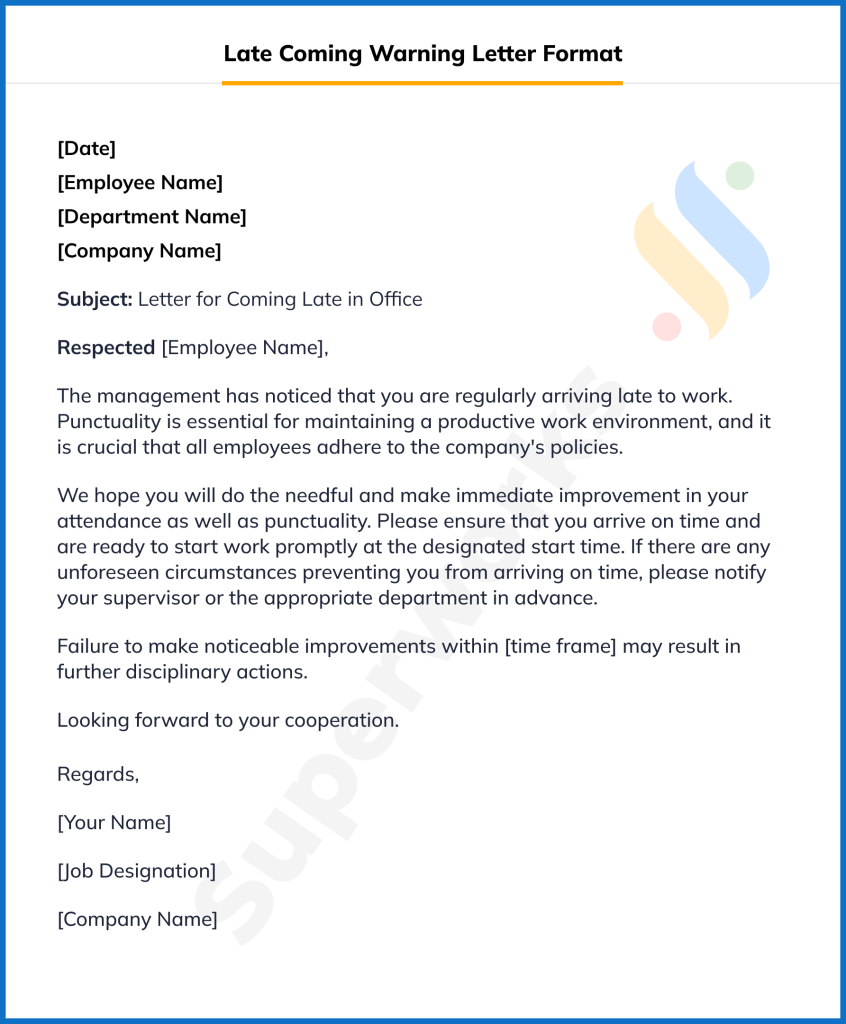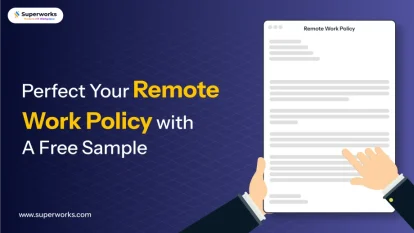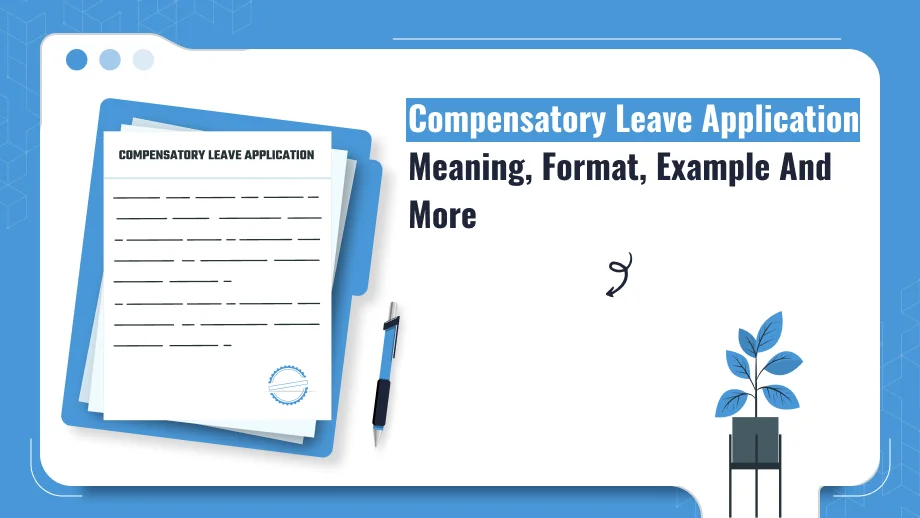Grab a chance to avail 6 Months of Performance Module for FREE
Book a free demo session & learn more about it!
-
Will customized solution for your needs
-
Empowering users with user-friendly features
-
Driving success across diverse industries, everywhere.
Grab a chance to avail 6 Months of Performance Module for FREE
Book a free demo session & learn more about it!
Superworks
Modern HR Workplace
Your Partner in the entire Employee Life Cycle
From recruitment to retirement manage every stage of employee lifecycle with ease.


Seamless onboarding & offboarding
Automated compliance & payroll
Track performance & engagement
6 Tips to Write a Professional Late Coming Warning Letter
- late coming warning letter
- 9 min read
- June 7, 2023

No matter how good an employee is, addressing tardiness is an essential aspect of maintaining discipline and productivity in the workplace. When faced with recurring instances of late arrivals, employers often resort to issuing a late coming warning letter to communicate the seriousness of the matter.
However, crafting a professional warning letter for employees who come late to work requires tact as well as precision to ensure its effectiveness.
In this blog, we will present 6 invaluable tips to help you write a warning letter that strikes the right balance between firmness and professionalism.
With these guidelines, you can communicate your expectations clearly, motivate employees to improve their punctuality, and foster a more productive work environment.
Let’s explore these tips and enhance your letter-writing skills once and for all!
Note:You can download directly from here and edit as per your need.
- Why Addressing Late Coming is Necessary?
- What is a Late Coming Warning Letter?
- Why is Issuing a Warning Letter for Late Coming Important?
- 6 Tips To Write A Professional Warning Letter To Employees Who Come Late to Work
- Things to Include in a Late Coming Warning Letter
- A Late Coming Warning Letter Template
- Bottom Line
Why Addressing Late Coming is Necessary?
Just like HRs issue a warning letter for negligence of duty and other concerns, addressing employees who show up late to work is equally necessary.
Firstly, punctuality is a fundamental aspect of professionalism and demonstrates respect for others’ time. When individuals consistently arrive late, it disrupts the workflow, creates a sense of frustration, and hampers productivity.
Secondly, addressing late coming fosters a positive work culture based on discipline and accountability. It sets clear expectations and encourages employees to prioritize their responsibilities.
In addition to this, by addressing this issue, organizations can ensure that meetings and collaborative efforts start on time, maximizing efficiency and reducing wasted resources.
Lastly, addressing late coming sends a message that the organization values punctuality, which can enhance its reputation and improve overall operational effectiveness.
What is a Late Coming Warning Letter?
A Late Coming Warning Letter is a formal communication from an employer to an employee who consistently arrives late to work.
It notifies the employee about their repeated tardiness and may include potential consequences if the issue continues. The letter aims to address the problem, provide an opportunity for improvement, and remind the employee of their responsibilities.
Why is Issuing a Warning Letter for Late Coming Important?
There are many reasons why issuing a Late Coming Warning Letter who come late to work is crucial.
Some of them are as follows:
1. Establishes Clarity:
A warning letter for late coming plays a crucial role in establishing clear communication between the employer and the employee. It explicitly addresses the issue of tardiness, leaving no room for misinterpretation or ambiguity.
2. Documentation for Reference:
By issuing a Late Coming Warning Letter, employers create a documented record of the employee’s repeated late arrivals. This documentation can be essential in tracking the employee’s behavior over time and can serve as evidence if further disciplinary actions or performance evaluations are required.
3. Reinforces Expectations:
The warning letter reinforces the expected standards of punctuality within the organization. It reminds employees of their responsibility to arrive on time and the impact their tardiness can have on team dynamics, productivity, and overall workplace morale.
4. Opportunity for Self-Reflection:
The letter provides an opportunity for the employee to reflect on their behavior and understand the consequences of their actions. It prompts them to evaluate their punctuality and take necessary steps to rectify the issue.
5. Performance Improvement:
By addressing tardiness through a warning letter for employee coming late, employers give employees a chance to improve their punctuality and meet the expected standards. It serves as a proactive measure to encourage positive changes in behavior and performance.
6. Legal Protection:
In certain cases, issuing a Late Coming Warning Letter may be a prerequisite for initiating further disciplinary actions. By adhering to the appropriate procedures and documenting the warnings, employers can protect their legal rights if the employee’s tardiness persists or escalates.
7. Consistent Application of Policies:
The warning letter demonstrates that the employer maintains consistency in enforcing workplace policies and rules. It ensures that all employees are held to the same standards and treated fairly, which can contribute to a positive work environment.
8. Performance Management:
For employees who repeatedly ignore or disregard warnings about their tardiness, the warning letter serves as an essential step in the performance management process. It helps in identifying persistent performance issues and guiding subsequent actions, such as additional coaching, training, or disciplinary measures.
Read More – When and How to Issue an Employee Final Warning Letter: Best Practices!
6 Tips To Write A Professional Warning Letter To Employees Who Come Late to Work
Writing a warning letter for employees who show up late to work is no rocket science but drafting a professional one can be tricky.
To crack it, here are 6 effective tips for you:
1. Use a formal tone:
When drafting a employee warning letter for late coming to work, it is essential to maintain a formal and professional tone throughout the communication.
Avoid using casual or overly personal language, as it may undermine the seriousness of the matter at hand. Use proper salutations and maintain a respectful tone throughout the letter.
2. Clearly state the purpose:
The introductory paragraph of the letter should clearly state the purpose of the communication. Make it explicit that the letter serves as a warning regarding the employee’s frequent late arrivals. This sets the tone and ensures that the employee understands the gravity of the situation.
3. Provide specific details:
To strengthen your case and demonstrate that you have been closely monitoring the employee’s attendance, include specific information about the instances of late arrival. Mention the dates, times, and duration of each occurrence. This provides objective evidence and makes it clear that tardiness is a recurring issue.
4. Highlight the impact:
Clearly articulate the negative impact the employee’s late arrivals have on their own work, their colleagues, and the overall productivity of the organization.
Emphasize the importance of punctuality and how it contributes to an efficient and harmonious work environment. By outlining the consequences of the employee’s actions, you can help them understand the significance of their punctuality.
5. State the consequences:
It is essential to communicate the potential consequences or disciplinary actions that may follow if the employee’s tardiness persists.
Outline the progressive disciplinary policy of your organization, which may include verbal warnings, written warnings, or more severe actions, depending on the severity and frequency of the late arrivals. Ensure that the employee understands the potential repercussions of continued tardiness.
6. Offer assistance & solutions:
While it is crucial to address the issue at hand, it is equally important to offer support and assistance to the employee. Include a section in the letter that discusses ways in which the employee can improve their punctuality.
Provide suggestions, such as setting alarms, adjusting commute time, or utilizing time management techniques.
Encourage open communication and invite the employee to discuss any challenges or obstacles they may be facing that contribute to their tardiness. This shows your willingness to help them rectify the situation and improve their performance.
Read More – 5 Myths of Warning Letter Format

Can’t find smart HR letter templates? Find it here!
Rely on Superworks HR toolkit for advanced & impressive templates and samples for all business as well as HR needs. With the HR toolkit, you will never find drafting HR letters and emails difficult.
So, get your hands on 100s of HR letter templates for FREE!
Things to Include in a Late Coming Warning Letter
A Late Coming Warning Letter must have the following details:
1. Employee’s information:
Include the employee’s name, position, department, and any relevant identification details.
2. Statement of concern:
Clearly express your concern regarding the employee’s repeated late arrivals at work.
3. Specific instances:
Provide detailed information about the dates or time periods when the employee was late. Mention the number of occurrences and any patterns observed.
4. Company policies:
Refer to the company policies or employee handbook that outline expectations regarding punctuality and attendance. Highlight the importance of adhering to these policies.
5. Impact on the organization:
Explain the negative impact of the employee’s late arrivals on the organization, team, or work processes. This could include disrupted workflow, delays in tasks, reduced productivity, or strained team dynamics.
6. Previous discussions or warnings:
If you have previously addressed the issue with the employee, mention those conversations or any prior warnings given. This serves as a reminder that the issue has been brought to their attention before.
7. Expected standards and consequences:
Clearly state the expected standards of punctuality and attendance. Specify the exact time the employee is expected to arrive at work and any consequences for continued tardiness. This could range from verbal warnings to written warnings, loss of privileges, or further disciplinary action.
8. Support & assistance:
Offer support and assistance to the employee in improving their punctuality. Provide suggestions for overcoming obstacles, such as adjusting transportation arrangements or modifying schedules. Reiterate that you are available to discuss any challenges they may be facing.
9. Timeframe for improvement:
Set a specific timeframe for improvement and request the employee to make a conscious effort to improve their punctuality within that period.
10. Signature & date:
Sign the letter and include the date to authenticate it.
Read More – What is a Regret Letter & Why is it Known as the Catalyst for Growth?
A Late Coming Warning Letter Template
Bottom Line
In conclusion, HR management tools play a vital role in writing a professional late coming warning letter, requiring careful consideration to effectively address the issue of tardiness in the workplace.
By clearly communicating the incidents of late arrivals, employers can provide employees with a factual basis for their concern. It is important to maintain a respectful tone throughout the letter, while still emphasising the impact of tardiness on productivity and teamwork. Check out poor performance warning letter.
So, the next time you write a warning for employees who come late to work, make sure to implement the aforementioned tips, thereby addressing the issue effectively and promoting a more punctual & productive work environment. Checkout our HR toolkit.
Also see: employee application for leave





